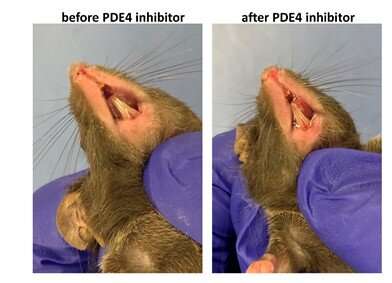
Researchers studying mice made a serendipitous discovery that could lead to a new dry mouth treatment. More than 10% of people experience dry mouth, which can be caused by medical conditions, radiation treatment, certain medications and aging.
Abigail Boyd, a doctoral candidate at the University of South Alabama, and colleagues made the new discovery while exploring the anti-inflammatory benefits of inhibiting phosphodiesterase-4 (PDE4) enzymes in a mouse model of bacterial lung infection. After noticing that mice treated with a PDE4 inhibitor were salivating, they decided to examine whether this observation could be translated into a dry mouth therapy. They also looked at the implications of the discovery for cystic fibrosis, which causes persistent lung infections and limits the ability to breathe over time.
“Saliva, while often taken for granted, is indispensable for oral health and overall well-being,” said Boyd. “New ways to treat dry mouth are needed since treatment options are currently limited.”
Boyd will present the new research at the American Society for Pharmacology and Experimental Therapeutics annual meeting during the virtual Experimental Biology (EB) 2021 meeting, to be held April 27-30.
The researchers were working with several distinct PDE4 inhibitors including roflumilast, a PDE4 inhibitor that is used clinically for the treatment of chronic obstructive pulmonary disease. Their analysis revealed that PDE4 inhibitors increase salivation by inhibiting PDE4 in the salivary glands and in the autonomic nervous system, which regulates involuntary body processes such as breathing.
“Although the causes of salivary gland dysfunction are varied, there is often an inflammatory component,” said Boyd. “Thus, in addition to stimulating salivary secretions, PDE4 inhibition may also exert therapeutic benefits by alleviating the inflammatory responses that cause salivary gland dysfunction.”
The researchers also studied the effects of PDE4 inhibition in a mouse model of cystic fibrosis. Cystic fibrosis occurs when the body doesn’t make the cystic fibrosis transmembrane conductance regulator (CFTR) protein or doesn’t make it correctly. This protein helps maintain the balance of salt and water on many surfaces in the body, including the lungs. In the new work, the researchers showed, for the first time that PDE4 controls CFTR-dependent salivation in mice. This finding suggests that PDE4 could have therapeutic potential for helping alleviate decreased CFTR function in patients with cystic fibrosis.
Source: Read Full Article